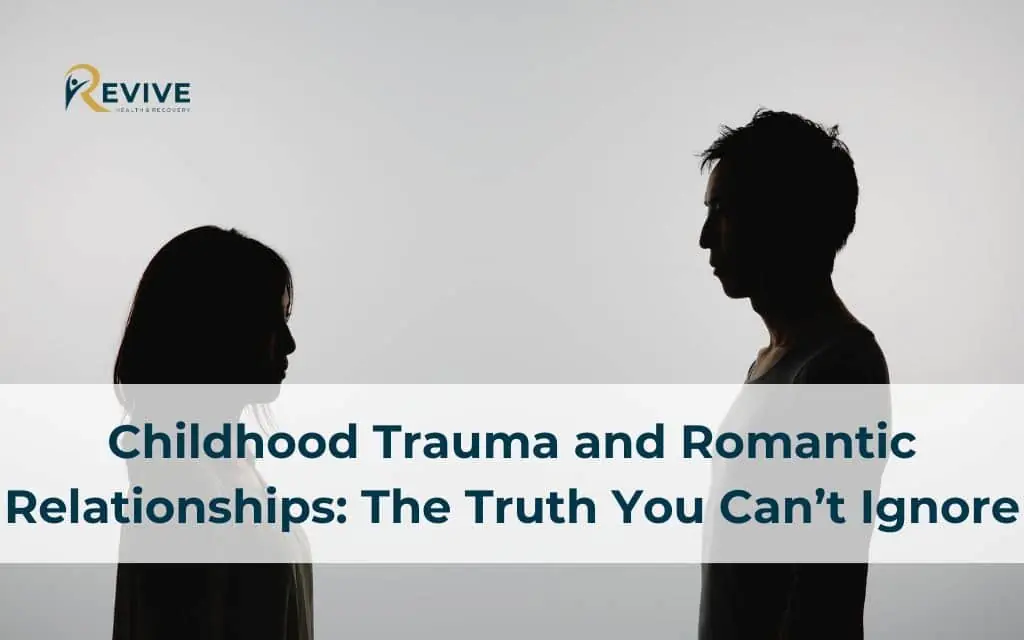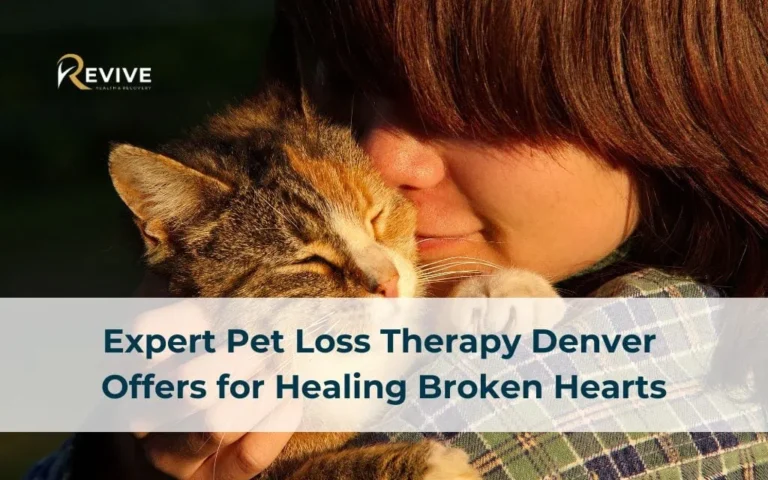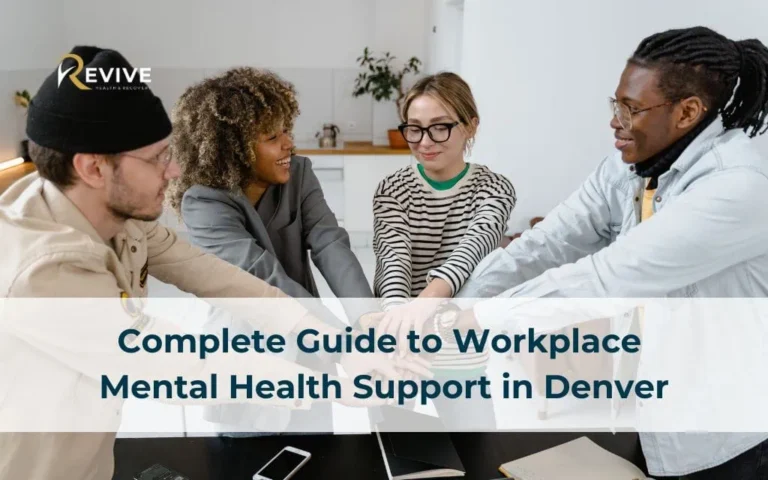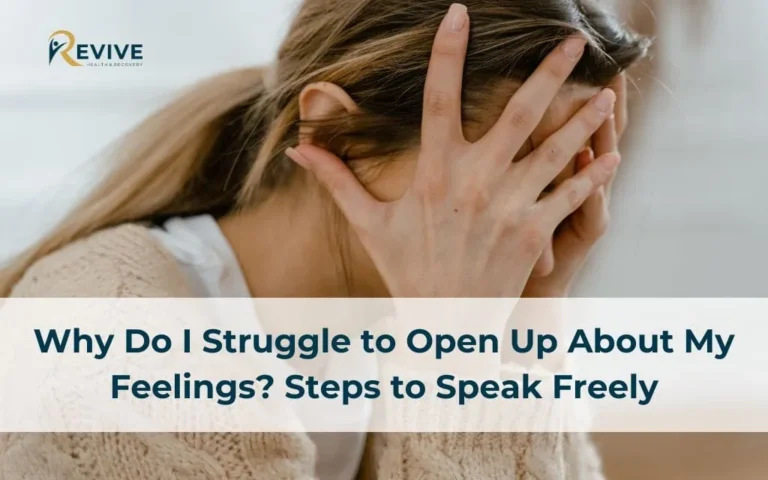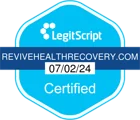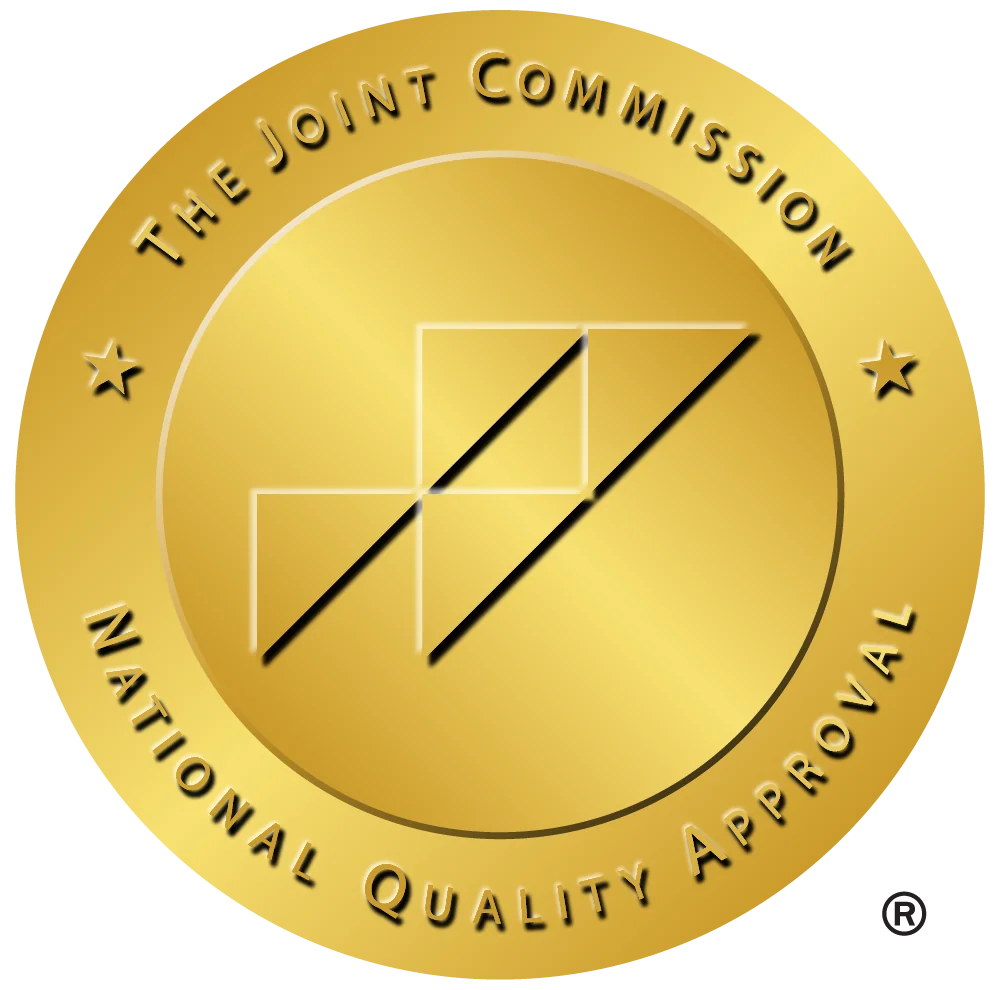Have you ever wondered why some relationship patterns keep repeating in your life, despite your best efforts to change them? The complex interplay between childhood trauma and romantic relationships might hold the key to understanding these persistent challenges. For many Colorado residents, particularly those in Denver, finding the right resources to address the deep impact of early life experiences on adult relationships can be life-changing.
At Revive Health Recovery, we’ve helped countless individuals recognize and heal the wounds that childhood trauma inflicts on their capacity for healthy connections. Let’s explore how these early experiences affect your relationships today and what pathways to healing are available right here in Colorado.
Understanding Childhood Trauma and Its Impact on Relationships
Childhood trauma refers to harmful or distressing experiences before age 18 that overwhelm a child’s ability to cope, as explained by the American Psychological Association. These experiences leave lasting imprints on developing minds and bodies, often manifesting years later in romantic relationships. When we understand this connection, we can begin the journey toward healthier relationships.
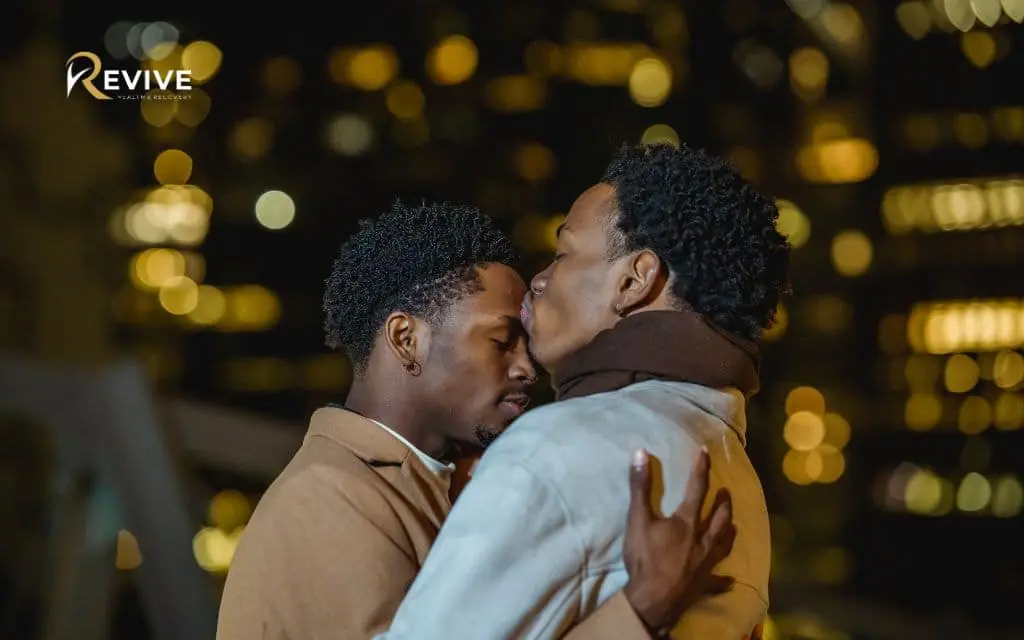
What Qualifies as Childhood Trauma?
Trauma takes many forms – from obvious physical or sexual abuse to more subtle emotional neglect, as detailed in the CDC’s overview of Adverse Childhood Experiences (ACEs). What they share is their powerful impact on development. For Colorado residents, the prevalence of adverse childhood experiences matches national trends, with nearly 60% of adults reporting at least one ACE.
“Childhood trauma doesn’t just happen in obviously dysfunctional homes,” explains Dr. Maria Collins, Lead Trauma Specialist at Revive Health Recovery. “Even well-intentioned families can inadvertently create environments where a child’s emotional needs go unmet.”
Common forms of childhood trauma include:
- Physical abuse or witnessing violence
- Sexual abuse or inappropriate boundaries
- Emotional abuse or persistent criticism
- Neglect (physical or emotional)
- Household dysfunction (substance abuse, mental illness, incarceration)
- Parental separation or loss
Each of these experiences can profoundly shape how we approach intimate connections later in life. If you recognize any of these patterns from your childhood, call Revive Health Recovery at (303) 268-4655 to discuss how these experiences might be affecting your current relationships.
The Science Behind Trauma’s Impact on the Brain
The neurobiological changes from childhood trauma create lasting alterations in brain development, which can contribute to conditions like PTSD, as explained by Mayo Clinic. When a child experiences chronic stress, their brain’s stress response system becomes permanently recalibrated. This affects areas responsible for emotional regulation, trust, and attachment – all crucial components of healthy romantic relationships.
Here in Colorado, where the high altitude already affects brain chemistry in unique ways, trauma responses may manifest differently than in other regions. Some Denver residents report heightened anxiety and stress responses, which can further complicate relationship dynamics for trauma survivors.
“The brain develops in response to its environment,” notes Dr. Collins. “When that environment includes trauma, the brain adapts in ways that prioritize survival over connection. These adaptations make perfect sense during childhood but can create significant obstacles in adult relationships.”
Adverse Childhood Experiences (ACEs) and Relationship Outcomes
Research on adverse childhood experiences (ACEs) demonstrates clear connections between early trauma and adult relationship difficulties. Higher ACE scores correlate with increased rates of divorce, relationship dissatisfaction, and patterns of unhealthy relationships.
Colorado-specific research shows our state has slightly higher rates of childhood trauma related to substance use in the home, which creates particular challenges for forming healthy attachments. The good news? Interpersonal neurobiology research shows trauma can be healed through relationships – the very thing trauma damages can also be its remedy.
Wondering how your childhood experiences might be affecting your relationships? Contact Revive Health Recovery at (303) 268-4655 to schedule an assessment with our trauma-informed specialists.
Recognizing Trauma Patterns in Your Romantic Relationships
Understanding how childhood trauma manifests in your current relationships is the first step toward transformation. These patterns often operate outside our awareness, making them particularly difficult to change without professional guidance.
Attachment Styles Formed By Childhood Experiences
Our earliest experiences with caregivers create blueprints for how we expect relationships to function, shaping attachment styles as described by Psychology Today. When childhood trauma disrupts these formative experiences, it often leads to insecure attachment styles that play out in adult romantic relationships:
- Anxious attachment: Fear of abandonment, constant need for reassurance, emotional volatility
- Avoidant attachment: Difficulty with intimacy, emotional distance, prioritizing independence over connection
- Disorganized attachment: Chaotic approach to relationships, simultaneously craving and fearing closeness
“Many clients come to us confused about why they keep choosing partners who aren’t available or why they push away partners who are,” says Relationship Therapist Sarah Johnson at Revive Health Recovery. “Understanding your attachment style is often the missing piece that makes sense of these patterns.”
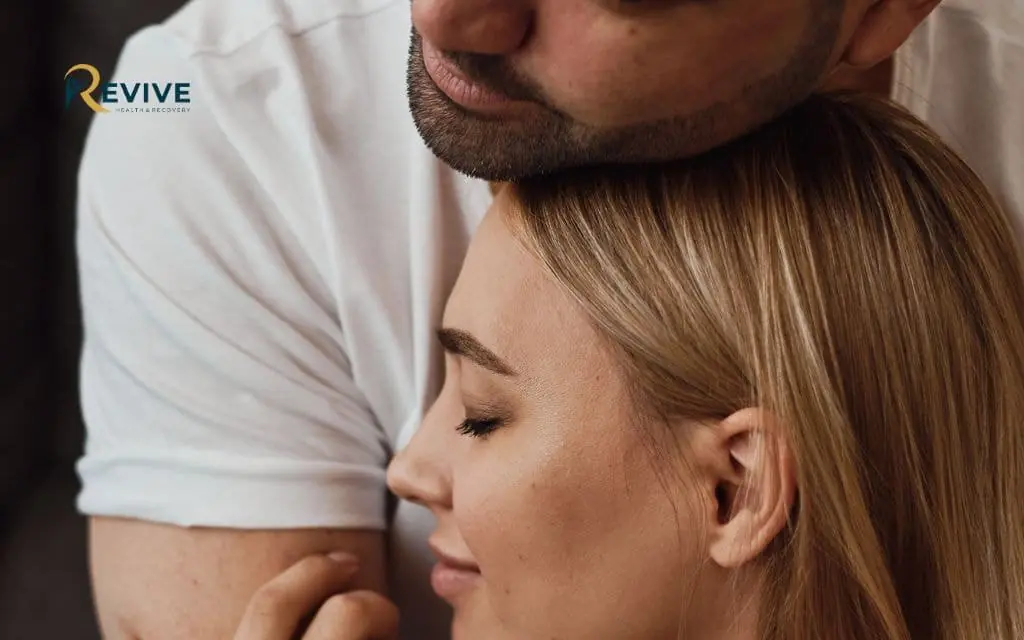
Denver has specialized trauma-informed couple therapy programs designed specifically to address attachment injuries and create more secure bonds. These approaches recognize that healing attachment trauma requires both individual and relational work.
Common Relationship Struggles Stemming From Childhood Trauma
In the link between childhood trauma and romantic relationships, do any of these patterns sound familiar?
- Persistent trust issues despite a trustworthy partner
- Extreme emotional reactions to minor relationship issues
- Difficulty articulating needs or setting boundaries
- Feeling emotionally numb or disconnected during intimate moments
- Conflict avoidance or explosive arguments with no resolution
- Choosing partners who reinforce negative beliefs about yourself
These challenges all connect to how childhood trauma affects adult relationship functioning. In Colorado’s unique cultural landscape, these patterns may express themselves differently, especially in communities where emotional expression is less encouraged.
“What’s fascinating is how universal these patterns are, while also being uniquely expressed by each individual,” notes Dr. Collins. “That’s why personalized treatment is so essential.”
Trauma Bonding in Relationships
Many trauma survivors find themselves drawn to relationships that recreate familiar dynamics from childhood – a phenomenon known as trauma bonding. This powerful attachment to unhealthy relationships often feels intense and compelling, despite causing suffering.
Breaking trauma bonds in romantic relationships requires specialized support, particularly in Colorado where geographical isolation can intensify unhealthy relationship dependencies. Denver trauma counseling centers like Revive Health Recovery offer programs specifically designed to interrupt these cycles.
Ready to break free from unhealthy relationship patterns? Our trauma recovery Colorado specialists can help. Call (303) 268-4655 to learn about our relationship-focused trauma programs.
The Colorado Perspective: Trauma and Relationships in Denver
Colorado’s unique environment creates both challenges and opportunities for healing trauma in relationships. Understanding these regional factors can help you find the most effective path to recovery.
Unique Factors Affecting Denver Residents
Denver’s population faces unique mental health challenges due to its geographical isolation. While the beauty of the Rocky Mountains offers incredible opportunities for healing, the physical isolation can intensify feelings of emotional isolation – particularly challenging for trauma survivors already struggling with connection.
Additionally, Colorado’s higher rates of substance use disorders are often linked to childhood trauma, creating overlapping challenges for many individuals and couples. The state’s emphasis on outdoor activities and self-sufficiency can sometimes make it harder to acknowledge emotional vulnerabilities.
“We see many clients who’ve moved to Colorado seeking a fresh start,” explains Trauma Therapist Michael Roberts at Revive Health Recovery. “What they discover is that relationship patterns follow you wherever you go until you address their roots.”
Resources for Trauma-Informed Relationship Support in Colorado
Denver offers numerous options for couples affected by childhood trauma:
- Specialized trauma-informed couple therapists
- Trauma recovery groups focusing on relationship healing
- Weekend intensives for couples in crisis
- Individual trauma therapy with relationship focus
- Telehealth options for mountain communities
Trauma may manifest differently in various cultural contexts in Colorado, which is why culturally responsive care is essential. Revive Health Recovery offers therapists trained in understanding how cultural background intersects with trauma expression.
Seeking childhood trauma and romantic relationships help shouldn’t mean compromising on trauma-informed care. Contact us at (303) 268-4655 to learn about our specialized approach to healing childhood trauma in the context of intimate relationships.
Why Colorado’s Outdoor Environment Can Aid Healing
Colorado’s outdoor lifestyle can be leveraged as part of trauma recovery in unique ways. Nature-based therapies offer powerful complements to traditional treatment approaches:
- Mindful hiking for grounding and present-moment awareness
- Adventure therapy for couples to build trust and communication
- Outdoor meditation practices that leverage Colorado’s natural beauty
- Wilderness experiences that provide metaphors for relationship journeys
“The natural environment provides powerful opportunities for experiential learning,” says Adventure Therapist Jessica Williams. “When couples can literally support each other on a challenging trail, they’re building neural pathways for support in their relationship.”
Healing Pathways: Moving Beyond Childhood Trauma in Relationships
The good news about childhood trauma and romantic relationships is that healing is absolutely possible. With appropriate support, trauma survivors can develop secure, fulfilling connections.
Trauma-Informed Therapy Approaches in Denver
Local Denver trauma specialists are combining traditional therapy with innovative approaches to create comprehensive healing experiences. At Revive Health Recovery, we employ multiple evidence-based methodologies:
- EMDR therapy for processing traumatic memories that affect current relationships
- Somatic experiencing to address trauma held in the body
- Cognitive-behavioral approaches for changing unhelpful relationship thoughts
- Attachment-focused therapy to rebuild capacity for secure connection
“Effective trauma treatment isn’t one-size-fits-all,” emphasizes Dr. Collins. “We create individualized treatment plans that address each person’s unique history, relationship patterns, and goals.”
Revive Health Recovery offers specialized trauma recovery programs in Denver, designed specifically for addressing how childhood experiences affect adult relationships. Call (303) 268-4655 to learn which approach might be right for you.
Building Secure Attachment with Your Partner
Healing attachment trauma adults experience requires actively building new patterns of security. This process includes:
- Creating emotional safety through consistent responsiveness
- Learning to recognize and communicate feelings effectively
- Establishing healthy boundaries that protect without isolating
- Practicing vulnerability in manageable doses
- Developing repair strategies for when connection breaks
“The beauty of working with couples is that we can create new experiences of security right in the therapy room,” explains Relationship Specialist Johnson. “These corrective emotional experiences rewire the brain’s expectations about relationships, helping partners learn how to love someone with a history of childhood trauma.“
Self-Healing Practices for Trauma Survivors
Between therapy sessions, there’s much you can do to support your healing journey, such as the coping strategies outlined by HelpGuide.org:
- Mindfulness practices to increase awareness of trauma responses
- Emotional regulation techniques for managing relationship triggers
- Self-compassion exercises to counter shame and self-criticism
- Journaling to identify patterns and increase insight
- Body-centered practices to release trauma stored physically
Colorado offers unique resources for self-directed healing, including numerous mindfulness communities and trauma-informed yoga studios in Denver and surrounding areas.
Would you like personalized guidance on self-healing practices? Our trauma specialists can create a customized plan for you. Reach out at (303) 268-4655 to schedule a consultation.
When Your Partner Has Experienced Childhood Trauma
Supporting a partner with childhood trauma requires understanding, patience, and often professional guidance on how to help someone heal from childhood trauma. This journey can be challenging but also deeply rewarding as you build a relationship capable of healing rather than reactivating old wounds.
Understanding Your Partner’s Trauma Responses
When someone has experienced childhood emotional neglect or other forms of trauma, certain relationship moments can trigger profound distress. Common trauma responses include:
- Shutting down emotionally during conflict
- Becoming hypervigilant about potential rejection
- Misinterpreting neutral comments as criticism
- Struggling to receive love and care
- Reacting with fight-or-flight responses to minor stressors
“What often looks like relationship problems are actually trauma responses,” notes Dr. Collins. “When partners can recognize this, it transforms how they interpret each other’s behavior.”
Understanding how to navigate a relationship with someone who has experienced childhood trauma can make all the difference.
Supporting Without Caretaking
Finding the balance between supportive partnership and unhealthy caretaking is crucial when loving someone with trauma history:
- Offer compassion without trying to “fix” your partner
- Maintain your own self-care and boundaries
- Recognize when professional help is needed
- Avoid taking trauma responses personally
- Create predictability and consistency in the relationship
“The most common pitfall we see is partners becoming therapists rather than partners,” explains Johnson. “This undermines the romantic relationship and rarely helps healing.”
Couples Therapy Options in Colorado
Trauma-informed couples therapy in Colorado offers specialized support for relationships affected by childhood trauma:
- Emotionally Focused Therapy (EFT) for rebuilding secure attachment
- Gottman Method for improving communication and connection
- Psychobiological Approach to Couple Therapy (PACT) for addressing nervous system regulation
- Internal Family Systems (IFS) for healing parts of self affected by trauma

Weekend intensives can be particularly effective for couples in crisis, while weekly sessions provide ongoing support for incremental change. Finding the right therapist match is essential for effective trauma work.
Ready to transform your relationship through healing childhood trauma? Contact Revive Health Recovery at (303) 268-4655 to schedule a couples consultation.
Revive Health Recovery: Specialized Trauma Treatment in Denver
At Revive Health Recovery, we’ve developed comprehensive approaches to addressing how childhood trauma affects romantic relationships. Our programs combine the latest research with compassionate, individualized care.
Trauma-Focused Programs at Revive Health Recovery
Our trauma services include:
- Individual trauma processing therapy
- Couples therapy with trauma focus
- Group support for relationship healing
- Family therapy to address multigenerational patterns
- Integrated treatment for co-occurring conditions
We employ evidence-based approaches including EMDR, Cognitive Processing Therapy, Somatic Experiencing, and Attachment-Focused Therapy. Our team specializes in understanding the complex intersection of trauma history and relationship functioning.
The Revive Approach to Healing Relationship Trauma
What makes our approach unique is our commitment to:
- Trauma-informed assessment that identifies how specific childhood experiences affect current relationship patterns
- Individualized treatment planning that respects each person’s unique history and goals
- Family involvement when appropriate to heal broader relationship systems
- Long-term recovery support that continues beyond the initial healing phase
“We recognize that healing is a journey, not a destination,” says Clinical Director James Thompson. “Our programs are designed to provide the right support at each stage of that journey.”
Success Stories from Colorado Residents
While protecting confidentiality, we can share that our clients report profound transformations in their relationships after addressing childhood trauma:
“After years of pushing away anyone who got close to me, I finally understand why intimacy felt so threatening. Working with Revive has helped me create my first truly secure relationship.” – Denver resident, age 34
“My husband and I were on the brink of divorce when we came to Revive. Learning how both our childhood traumas were playing out in our relationship changed everything. We’re now building the connection we always wanted.” – Boulder couple
These transformations demonstrate how healing childhood trauma can revitalize romantic relationships that once seemed beyond repair.
Interested in your own success story? Call us at (303) 268-4655 to learn how our specialized trauma programs in Denver can help transform your relationships.
Taking the First Step Toward Healing in Colorado
Beginning the journey of healing childhood trauma takes courage. Recognizing when you’re ready and knowing what to expect can make that first step less daunting.
Signs You’re Ready for Trauma Therapy
Consider seeking help if:
- You notice the same relationship problems recurring despite changing partners
- Past traumatic experiences intrude on your current relationship
- You find yourself overreacting to minor relationship issues
- Intimacy feels consistently uncomfortable or threatening
- You’re aware of trauma history but unsure how to heal from it
- Your partner has expressed concern about your relationship patterns
“Readiness for healing often comes when the pain of staying the same exceeds the fear of change,” reflects Dr. Collins. “That tipping point is different for everyone.”
What to Expect in Trauma-Focused Therapy
When you begin trauma therapy at Revive Health Recovery, you can expect:
- A comprehensive assessment of your trauma history and relationship patterns
- Education about how trauma affects relationships
- Development of safety and stability skills before processing trauma
- Gradual, supported processing of traumatic experiences
- Integration of new insights into relationship behaviors
- Practical application of new skills in current relationships
The timeline varies based on trauma severity, support systems, and individual factors, but most clients begin experiencing meaningful improvements within the first few months of treatment.
Financial Considerations for Treatment in Denver
We understand that treatment costs are an important consideration. Revive Health Recovery works with most major insurance providers, and we offer various options to make treatment accessible. While specific costs depend on individual treatment plans and insurance coverage, we’re committed to helping you find a sustainable path to healing.
For detailed information about coverage options and costs for your specific situation, call our admissions team at (303) 268-4655.
FAQs about Childhood Trauma and Relationships
Can childhood trauma affect relationships even if I don’t remember the trauma?
Absolutely. Much of trauma’s impact occurs through implicit memory systems that operate below conscious awareness. At Revive Health Recovery, our trauma-informed therapy helps uncover these hidden connections between past experiences and current relationship patterns, even when explicit memories are unavailable.
How long does relationship healing take after childhood trauma?
Each healing journey is unique, but most clients see meaningful improvements within 3-6 months of consistent therapy. Revive Health Recovery offers the most comprehensive trauma recovery programs in Denver, with treatment plans tailored to your specific timeline and needs.
Is it possible to have a healthy relationship if I experienced severe childhood trauma?
Yes! With appropriate treatment, even those with severe childhood trauma can develop secure, fulfilling relationships. Revive Health Recovery specializes in helping trauma survivors build secure attachment, using cutting-edge approaches that leverage the brain’s natural capacity for healing.
What if both partners in a relationship have childhood trauma?
When both partners have trauma histories, relationships can be more complex but also offer unique opportunities for mutual healing. Revive Health Recovery’s trauma-informed couples therapy provides specialized support for this situation, helping couples break trauma cycles and build healing connections.
Are there specific therapists in Denver who specialize in childhood trauma and relationships?
Yes, Denver has several qualified trauma-focused relationship therapists, with Revive Health Recovery offering the most specialized team. Our clinicians have advanced training in both trauma treatment and relationship therapy, making us uniquely qualified to address this intersection.
Healing Is Possible: Your Next Step
The connection between childhood trauma and romantic relationships is powerful but not permanent. With appropriate support, you can transform patterns that have shaped your relationships for years, creating the secure, fulfilling connection you deserve.
At Revive Health Recovery, we’re committed to providing Denver and Colorado residents with state-of-the-art trauma treatment that specifically addresses relationship healing. Our compassionate team understands the unique challenges Colorado residents face and offers personalized pathways to recovery.
Don’t let childhood trauma continue to define your love life. Contact Revive Health Recovery today at (303) 268-4655 or visit our website to schedule a confidential consultation. Your journey toward healthier relationships can begin right now.
